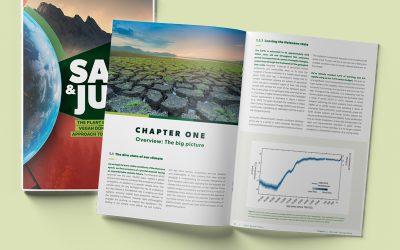Blog
Why COP28 And All Climate Conferences Must Go Vegan
July 21, 2023
The best thing we can do to help the earth is to eat a plant-based diet and ditch all animal products. The Plant Based Treaty, now signed by over 100,000 people, including top scientists, celebrities, athletes, politicians, health care organizations, businesses, and cities, believes in putting food systems at the heart of combating the climate crisis. They wisely call for the negotiation of a global treaty and local implementation at municipal levels, schools, universities, hospitals, businesses, and other local institutions. By promoting a shift to healthier, kinder, and more sustainable plant-based diets, we can actively reverse the damage done to our earth.
Between November 30th and December 12th, 2023, the United Nations will hold the 28th climate change conference. COP28 will meet in Expo City Dubai to continue their discussions about ambition and responsibilities and to identify and assess climate measures. Over 70,000 participants are expected to attend, including heads of state, government officials, industry leaders, academics, and representatives from civil society organizations. The Plant Based Treaty is asking the United Nations Framework Convention on Climate Change (UNFCCC) to show climate action leadership by encouraging the hosts of COP28 to provide 100% plant-based catering and to create a policy for future climate conferences to offer 100% plant-based menus.
COP28 is coming at a crucial time as our planet is literally on fire due to early-season wildfires caused by climate change. The world must implement plant-based solutions to combat the severe climate crisis we face. The Plant Based Treaty’s new petition calls for three points to be addressed by COP28.
1. 100% plant-based catering during COP28 and all UN climate conferences and offices, showcasing locally sourced veganic produce where possible
Research proves that shifting to a plant-based diet focusing on fruits, vegetables, grains, and beans helps protect our planet from further destruction because animal agriculture producing meat and dairy products from animals is fueling the climate crisis.
“Shifting diets from meat and other animal products to plant-based diets has a high potential for reducing carbon footprints and mitigating climate change, as well as improving human health, according to Climate Change 2022: Mitigation of Climate Change, a report from the United Nations’ Intergovernmental Panel on Climate Change.” – Physicians Committee for Responsible Medicine
Demand one of the Plant Based Treaty is “relinquish” and aims to stop problems from increasing. There should be no building of new animal farms, new slaughterhouses, and no conversion of plant-based agriculture to animal agriculture. Instead, farmers can make the switch from animal agriculture to vegetable farms.

If the 70,000 participants attending COP28 eat two vegan meals daily, this equates to 1.8 million climate-friendly plant-based meals. For example, if beef were swapped out for plant-based protein and all dairy and cheese to plant-based alternatives, this would spare almost 40,000 metric tonnes of greenhouse gas emissions (CO2e), 64 square kilometers of land, and 728 million liters of water. That’s equivalent to the emissions from driving over 154 million miles (taking 8,600 cars off the road for a year), more than the land area of Manhattan.
> For beef to tofu or peas swap: 37,510 metric tonnes of CO2e saved.
> For milk and cheese to soy milk and soy-based cheese swap: 2,017 metric tonnes of CO2e saved.
> Total GHG savings = 37,510 + 2,017 = 39,527 metric tonnes of CO2e. That’s equivalent to greenhouse gas emissions from driving an average passenger car about 154 million miles, or about taking about 8,600 cars off the road for a year.
2. A focus on the multitude of benefits and opportunities of a transition towards a plant-based food system to address the triple threat of the climate crisis, food insecurity and the cost of living crisis
Use the Food and Water Systems Day at COP28 on December 5, 2023, to focus on plant-based solutions following calls from twenty-one cities, including the Scottish Capital Edinburgh and Los Angeles, for world leaders to negotiate a Plant Based Treaty as a companion to the Paris Agreement.
A colossal waste of water comes from animal agriculture, so it makes sense for COP28 to address water issues on their water systems day. The graph from Environmental Impacts of Food Production proves that (dairy) cheese, farmed fish, beef (cows), and poultry (chickens) use enormous amounts of water. If COP28 swaps out dairy milk for soy milk, which uses way less water, they will be helping the earth instead of hurting it. The same is true of swapping out beef, fish, and poultry for tofu or pea protein; vast amounts of water will be saved.
By focusing on plant-based solutions mentioned in demand 2 of the Plant Based Treaty, “redirect”, we eliminate the driving force behind the problem. This includes making food security a priority for all nations, focusing on ending poverty and hunger and making nutritious food accessible for all. Addressing the methane emergency is also crucial, as Plant Based Treaty documents reveal;
“According to the United Nations, a 0.3°C temperature rise could be averted by 2045 if methane emissions were cut by 45% this decade. As the leading source of human-caused methane emissions, a transition away from animal agriculture to a sustainable plant-based food system would help us meet these goals as soon as possible.”
The United Nations states one answer to the climate crisis is taking a comprehensive look at how using land for animal agriculture is a significant driver of climate change. Their special report on Climate Change and Land explains “desertification, land degradation, sustainable land management, food security, and greenhouse gas fluxes in terrestrial ecosystems.”
3. COP28 to take a zero-tolerance approach to greenwashing by the animal agriculture lobby by ensuring industry representatives are not platformed for the purposes of promoting unproven measures that are at odds with the latest IPCC science
Animal agriculture industries use greenwashing tactics to hide the true impacts that meat, dairy, egg, and fishing industries actually have on our planet. You have probably seen commercials on television or billboard ads of happy grazing cows and beautiful green pastures because if the dairy and meat industries showed the gruesome living conditions cows are forced to endure and how the mother dairy cow begs and cries when her baby is stolen for veal at one day old and basically if they told the truth about the dairy and meat industries, they would surely lose sales.
These same meat and dairy industries greenwash to try and justify their actions. Be on the lookout for terms like “grass-fed beef”, “regenerative grazing”, “sustainable”, “low carbon”, “carbon offsets”, “local animal products”, “climate-friendly”, and many more.

The World Wildlife Fund’s Guide to Greenwashing explains to look for four things; buzzwords, evidence, verification and sustainability.
“Is the claim substantiated by third-party verifications or standards? Does it include the full scope of emissions, land or water use? How is this measured? Who is accountable for the results? If you can’t clearly articulate an answer, you know you are likely being swindled.”
Animal Justice has a Guide to Countering Greenwashing in the Meat Industry that is also very helpful when confronting the dishonest tactics and unregulated marketing terms animal agriculture uses.
It is imperative COP28 takes a zero-tolerance approach to greenwashing and switches to 100% plant-based catering. They must set the example for all future UN climate conferences and go vegan.

Miriam Porter is an award-winning writer who writes about veganism, social justice issues, and eco-travel. Miriam currently lives in Toronto with her son Noah and many rescued furry friends. She is a passionate animal rights activist and speaks up for those whose voices cannot be heard.
More from the blog
6 Important Calls To Action From The Safe And Just Report – Part One
By Miriam Porter
Grow Your Own Kale And Spinach For Healthy Green Smoothies
By Miriam Porter
The Importance Of Exercise And Tips On Building Muscle
By Miriam Porter



